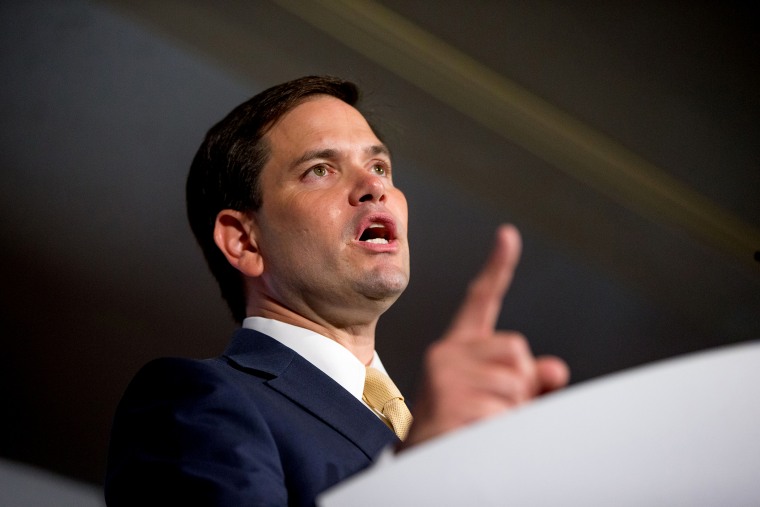The last time a major news outlet took a closer look at Sen. Marco Rubio's (R-Fla.) personal finances, it didn't go especially well. The New York Times published this lengthy piece three weeks ago today, noting that Rubio has occasionally been "imprudent" when it comes to his personal spending.
The article had some interesting details, but it was widely panned. Rubio soon after used the article as the basis for a fundraiser, and even "The Daily Show" mocked the piece.
But to dismiss the area of inquiry altogether would be a mistake. In fact, the Washington Post has a new report on Rubio's personal finances that moves the ball forward in some noteworthy ways.
Marco Rubio was 28 when he was elected to the Florida legislature. He was about to become a father and was struggling to balance the financial demands of a growing family with his political aspirations. About a year and a half after taking his seat in Florida's part-time legislature, Rubio got a financial boost, accepting a job at the Miami law firm Becker & Poliakoff for $93,000 a year. Although Rubio was a lawyer by training, his colleagues quickly recognized the advantage of having a charismatic, high-energy politician in the office.
What emerges is an unflattering portrait. Rubio was a part-time lawmaker and part-time lawyer, but those lines became less clear when the Florida Republican was able to help his firm's clients, many of whom were lobbying the state government in which the GOP lawmaker served.
The more Rubio "walked a narrow line between his work as a lawmaker and an employee of outside firms with interests before the state government," the more money he was paid. His annual income went from $72,000 when he was elected to $414,000 eight years later, as his two-year term as state House Speaker ended.
The Post's report added, "About 80 percent of his total income during his tenure in the state House came from Florida law firms that lobby state and local governments, according to a Washington Post analysis of state financial disclosure forms."
As best as I can tell, no one has accused of Rubio of violating ethics rules. That said, stories like these don't do the presidential candidate any favors -- he had one foot in the legislature and another foot in firms lobbying the legislature. The more power and influence Rubio had in the public sector, the more money he received from the private sector.
Whether, and to what extent, voters may care about any of this remains to be seen, though the Romney campaign in 2012 reportedly had concerns about Rubio's personal finances, which may give some insiders pause.
It doesn't help that Rubio admitted to misusing a Republican Party credit card to purchase personal items -- a mistake the Republican later acknowledged looked "bad," though he repaid the money.
